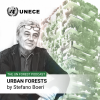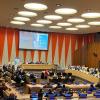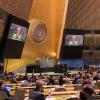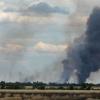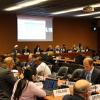Press Releases
Displaying Results 26 - 50 of 339
Public involvement in decision-making underpins the universal right to a clean, healthy and sustainable environment. 25 years since the adoption of a ground-breaking global treaty known as the Aarhus Convention – unparalleled in its success in putting environmental democracy into action – this
The accurate measurement of vehicles’ tailpipe emissions, a key element in governments’ policy decisions and consumers’ choices to reduce the impact on air quality and the environment, will be significantly enhanced thanks to the adoption today of the United Nations Regulation on global Real
Following strong reduction from exhaust particle emissions (PM 2.5 and 10) over the past 20 years, due to international and national vehicle regulations, non-exhaust sources now make up approximately 80% of particle emissions from vehicle use, compared to some 40% in 2000. Non-exhaust emissions
Trees belong in cities. Yet, as cities across the globe get bigger, trees and green spaces are lost to new buildings and infrastructure. With less than 20 percent of ground area covered by tree crowns, on average, cities all over the world need many more trees than they have today.
But why? Why do
UNECE welcomes the approval by the Cabinet of the Ministers of Ukraine of the procedure for maintaining a National Pollutant Release and Transfer Register. The Register, to be operational from 8 October 2023, is expected to facilitate the free provision of information on pollution, such as
The interlinkages between air pollution and climate change are manifold, even though discussions at the international level tend to often take place separately: air pollutants and greenhouse gases are often emitted by the same sources, leading to complex chemical interactions in the atmosphere. A
Guinea-Bissau has acceded to the UNECE Convention on Access to Information, Public Participation in Decision-making and Access to Justice in Environmental Matters (Aarhus Convention), bringing the total number of Parties to 47.
By promoting public engagement in environmental decision-making, the
Iraq today made history as the first country in the Middle East to join the Convention on the Protection and Use of Transboundary Watercourses and International Lakes (known as the UN Water Convention). It becomes the 49th Party to this unique international legal and intergovernmental framework,
In an unprecedented political push for cross-border water cooperation, Ministers from Africa, Latin America and the Middle East have declared at the UN Water Conference their country’s resolve to join a key United Nations accord known as the Water Convention.
In what could constitute a major
Italy and Kazakhstan have committed to reinforce action to uphold human rights to water and sanitation for all by joining the UNECE/WHO Europe Protocol on Water and Health, at the milestone UN Water Conference in New York.
Hungary, as Chair of the Protocol, also shared its commitment to help
As leaders gather in New York for the milestone UN Water Conference, Nigeria has taken a decisive step for cooperative water action by officially becoming the 48th Party to the Convention on the Protection and Use of Transboundary Watercourses and International Lakes (known as the UN Water
40 countries, regional integration and international organizations, international financial institutions, NGOs, academic and research centers have made a united call at the United Nations 2023 Water Conference to step up global efforts for transboundary water cooperation.
A joint statement
When leaders gather in New York on 22-24 March for the first major UN Water Conference in almost 50 years, the world must not miss the opportunity to secure greater cooperation on shared waters – which account for some 60% of global freshwater flow – as a prerequisite to address the global water
Today, following the example of several countries in the region, Niger officially confirmed its desire to accede to the United Nations Convention on the Protection and Use of Transboundary Watercourses and International Lakes, more commonly known as the Water Convention. This upcoming accession is
In response to the huge impacts on the environment of the war in Ukraine, the United Nations Economic Commission for Europe (UNECE) and partners including UNEP, OECD, UNDP, UNIDO, the World Bank and OSCE are joining forces though an inter-agency group to coordinate the assessment of environmental
Updated guidance published today by the United Nations Economic Commission for Europe (UNECE) will help governments to strengthen biodiversity monitoring as a basis for sharpened biodiversity protection policies across all sectors.
The guidance is the first of its kind to build on the historic
The upcoming meetings of the Transport, Health and Environment Pan-European Programme (THE PEP) Partnership on Active Mobility and the Partnership on Sustainable Tourism Mobility will focus on challenges in promoting and developing policies for walking and cycling, as well as exchange views on
While freshwater and marine specialists have largely worked in silos, nature has always worked as one: the land, freshwater, and ocean ecosystems are closely interlinked and interdependent. So must be their management.
Bringing together the freshwater and ocean communities, the Global Workshop
A new report on the effectiveness of international cooperation on cleaner air in the framework of the UNECE Convention on Long-range Transboundary Air Pollution (Air Convention) shows that while emission reductions have been achieved, countries in the Pan-European region and North America are set
The world’s biodiversity is being lost at an unprecedented rate, with one million animal and plant species now threatened with extinction.
Biodiversity and ecosystem services are of critical importance in underpinning the fight against poverty, supporting inclusive sustainable economic growth,
With current policies in place, the transport sector’s CO2 emissions will grow almost 20% by 2050 according to the International Transport Forum Transport Outlook, and even more in developing countries. Many stakeholders working to mitigate greenhouse gas (GHG) emissions from transport need, use
New research on the Costs of Inaction on air pollution reveals that in nearly half (26) of 56 countries in the Pan-European region and North America, the current monetary damage cost to health, ecosystems and the economy due to ambient air pollution corresponds to over 5 per cent of GDP. In at
A new step was taken by Panama in its process to join the Convention on the Protection and Use of Transboundary Watercourses and International Lakes (Water Convention) with the organization of a national workshop on 6-7 December, which gathered more than 60 stakeholders to identify priorities for
With water stress on the rise in shared river basins and aquifers, over 30 governments and organizations decide to join forces to push for greater cross-border water cooperation.
This year's terrible floods and droughts in almost all corners of the planet illustrate the critical importance of
Global biodiversity is now declining faster than at any time in human history. As leaders gather for the 15th Conference of Parties to the Convention on Biological Diversity (COP-15, 7-19 December), UNECE calls for the region to urgently step up with the leadership needed to stop biodiversity loss





